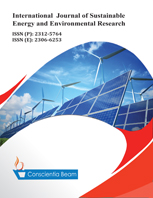Climate Change and Flood Disaster Management in Nigerian Urban Centres: The Architects’ Perspective
DOI:
https://doi.org/10.18488/journal.13/2015.4.3/13.3.64.72Abstract
The threat to lives and property by flood is now becoming very frequent and almost an annual event in many Nigerian urban centres, claiming many lives and property worth several billions of Naira in each occurrence. Although, several studies have traced the causes of the menace to human factors and topography, it has been predicted that the crisis is likely to be exacerbated by climate change with many of the sub-Sahara African countries most vulnerable. This has generated research interest among the scholars. The focus of most of these studies, however, seems to have skewed towards the urban paradigm, typologies, governance and behavioural control only, leaving the input of building professionals virtually untouched. As a prelude to amplifying the role of architects in the fight against the menace, this paper presents the science of climate change and its consequences with emphasis on flood disaster. It holds that integration of control and mitigation of flood risk into an overall design of buildings and other man-made enclosures is essential for the nation to cope with the challenge. It then discusses some of the ways these design goals can be accomplished. It closes by recommending the means by which the strategies can be propagated to the stakeholders.

